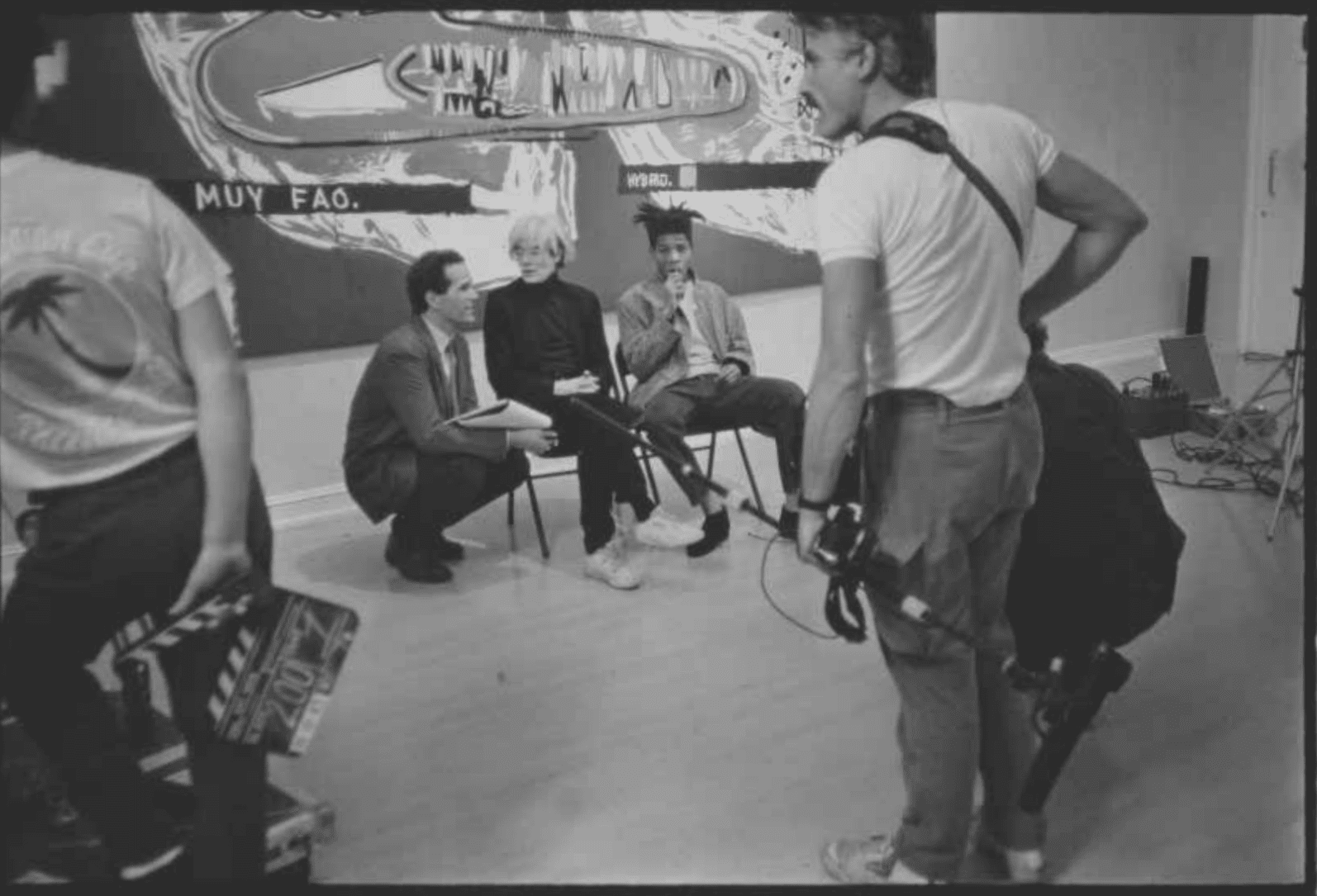Filmed interview conducted on 19 October 1985 for State of the Art, television series directed by Geoff Dunlop, produced by John Wyver and written by Sandy Nairne, Illuminations, UK. Episode broadcast on Channel 4, 11 January 1987.
Questions were posed by both Dunlop & Nairne.
Image: Paula Court. Sandy Nairne, Andy Warhol and Jean-Michel Basquiat at Tony Shafrazi Gallery, New York, October 1985, during filming for State of the Art, television series directed by Geoff Dunlop, broadcast on Channel 4, 11 January 1987. Photo © Paula Court.

1.
|
How did you get to be an artist?
What age were you when you said ‘I’m going to be an artist’? What was ‘an artist’ in your mind?
Can you tell me something of your background, what it was like when you were a kid?
Where from?
You were born in Brooklyn. Can you give me a sense of your family?
How did you learn to be an artist? Where did you learn your craft?
What kind of influences?
What did you look at?
|
In books?
So you went to museums as a kid?
Was that because of a family influence, or did you just
When you were a kid you did drawings and paintings; who were they for?
What got you painting?
Who was the painting for? Was it for you or were you trying to communicate to somebody?
Are you talking about a time in your life when you’d actually decided you were going to be an artist already?
When did you decide that?
And what happened to your work, did you just take it home and put it in a file or…
|
2.
|
Did you feel there were people around you who were trying to do the same thing?
You were involved in music; do you think your work is a bit like music, do you think it works in a similar kind of way? Painting?
It’s coming across really well, it’s OK. Do you feel kind of tense about it?
Is that because you think you can’t actually talk about paintings, it doesn’t get you anywhere, that words can get in the way?
Do you think your work is something you can actually talk about? Do you think that someone outside can take it to pieces, intellectualise it or write about it? Do you think it can be studied in that way, or should it be taken directly?
Do you learn anything from what people say about your work? Does that actually give you an insight into what people think?
So you were 20 and you were starting to paint; was there any kind of training or formal organisation, or were you still finding your own way?
|
Were people starting to notice?
What do you mean by ‘a personality’? Just through going to nightclubs and stuff like that. Is that part of your work? Does that relate to your work?
Who do you make a painting for? Who do you think of when you make a painting? [long silence] Do you make it for you?
Do you have a kind of picture of what that world might be?
Do you think your paintings work better in some places than in others, because you literally worked on the streets at one time, didn’t you?
Do you think it has a different impact, or comes across in a different way in different places like a gallery or in a home… you know in the different ways in which you can see a painting?
When you see them in a museum do you feel that you are a part of a tradition, you are moving along in a line?
Does that give you a good feeling?
|
3.
|
Why do you think it’s important? What makes you think it’s a good thing to be doing?
Is there something that’s really affected you, from any age? A kind of thing you might see in a museum… [cuts in]
In a way it’s like a report on a time… on the way people lived, when you see an old painting?
And do you think that you are making historical documents yourself?
What do you think that you’re saying about today?
But do you think that you are using the black character in the same way as Matisse used the white character? [cuts in]
Is it a political thing? [cuts in]
|
Do you feel that black art has not been seen in western society?
But you’ve broken through that haven’t you?
But do you find that being a black artist puts you into a stereotyped role, that you have to do certain things, there’s this kind of expectation of you? Or do you feel free?
You mean you maybe just hit a different time in some way? That there is something special about today that makes it easier for you to… get through?
Do you see yourself as a ‘hero’? The way an actor can be a hero, the way a musician can be a hero. Do you think that’s a good thing for an artist to be?
So you’ve hit a lucky time in a way?
Do you think that if you’d been working 20 years ago, you might have been more obscure, more…
Are there any problems from the media attention, the image thing?
|
4.
|
Why? [long silence]
Do you know why?
Why do you want obscurity?
When you make a piece, does it have a clear meaning, does it say one thing?
Can you talk about the kind of feelings that some of your work conveys?
Like what?
Let’s just go back to this showbiz thing. Do you think that art has become like showbiz now?
Do you like that?
In some ways it’s not fun?
|
Yes, sometimes they can turn on you.
They’ve done that to you?
Tell me how they’ve got at you, and put you in a box. [long silence]
How do you think you’ve changed? [long silence]
When I look at your paintings it looks as though you’ve read a thousand books, and that you’ve seen a thousand TV programmes, just pouring in. Is that what it feels like to you?
Where do the words come from?
Do you read a lot?
What do you like about the word? What is it that makes the word work for you?
It’s almost like they’re shapes…
|
5.
|
What about materials? Do you just use wood, canvas…
Why?
You’ve always worked with different kinds of materials,
Is the look of the thing the most important thing, the impact?
What’s the difference in your mind between paintings that work, and paintings that don’t?
|
Who are these figures in your paintings?
Sometimes the figures look really angry… is that intentional? [long silence]
Is there any anger in you?
What are you angry about? [long pause]
Do you think it’s different if you’re black and looking at your paintings, do you think they say different things?
Black people in this country get a rough deal, is that part of what your work’s about? Yeah I have to say so, yeah. |

